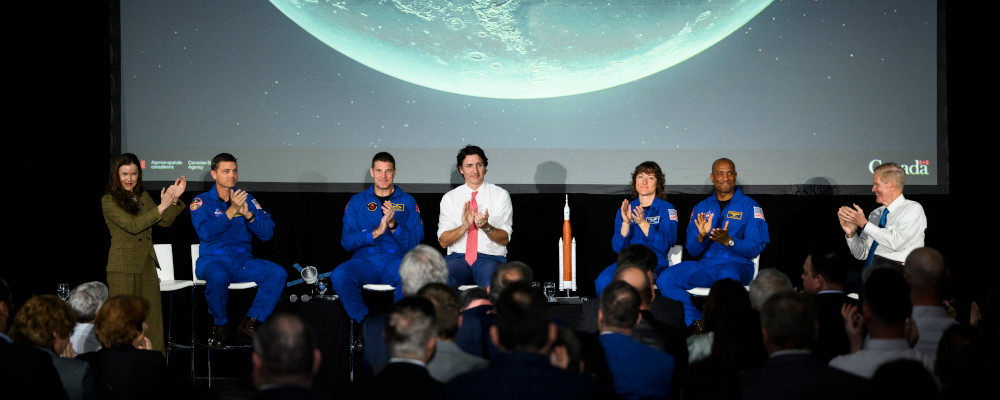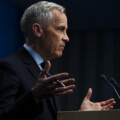Late last year, the federal government released a “what we heard” report that compiled the opinions of Canadians on a modern regulatory framework for space. Written submissions were received from Canadian stakeholders, including industry, academia, associations, think tanks, and the general public.
The feedback in the report will inform the now underway review of Canada’s new regulatory framework for space-related activities as set out in a document titled “Exploration, Imagination, Innovation: A New Space Strategy for Canada (EII).” The initial EII document outlines how a whole-of-government effort will be enacted to set a new vision for Canadian space exploration. It also calls for establishing a modern regulatory framework. The feedback in the report will assist in its creation.
François-Philippe Champagne, the minister of innovation, science, and industry, said upon announcing the report: “Through reviewing the framework, we are ensuring that Canada’s space-related regulations are keeping pace with the rapidly evolving and highly innovative global space sector so that the Canadian industry is equipped to compete in this global market.”
The consensus among the participating stakeholders was that Canada ought to make significant changes to its space regulatory framework to keep up with the rapidly growing global space industry. The need for Canada to adopt a modernized approach to space regulation was paramount.
Nearly all stakeholders agreed that a modern regulatory framework for space is necessary for Canada to benefit from current and future opportunities in space. Stakeholders advocated for a national space policy and national space governance body. Some of them suggested that such a policy should prioritize responsible Canadian behaviour in space and international cooperation in hopes of maximizing Canadian celestial involvement.
According to the report, the stakeholders suggested that a modern regulatory framework should work to support the growing Canadian space industry, encourage innovation, align with international partners, prioritize sustainability, mitigate risks, strike the right balance on security, and streamline involved administrative processes. Though, seemingly the core aim of this modern regulatory framework would be to encourage growth in the Canadian space economy, which currently relies on the country’s expanding space mining, technology development, and aerospace travel companies.
The international framework
Our neighbours to the south are leaps and bounds ahead of us when it comes to space regulation. In the United States, Vice President Kamala Harris chaired a meeting of the National Space Council (NSC) in December. The council’s role is to consult the president on national space policy and strategy and guarantee that the U.S. capitalizes on the opportunities presented by the country’s space activities.
At the December NSC meeting, Harris and NASA executives discussed the importance of international partnerships and the societal benefits of space exploration.
Additionally, Harris announced the United States Novel Space Activities Authorization and Supervision Framework, a new policy to complement the council’s legislative proposal, the Authorization and Supervision of Novel Private Sector Space Activities Act, which was transmitted to Congress in November.
The framework was developed to provide clear and predictable authorization and supervision of commercial novel space activities, which are defined as those that are not directly regulated under the current U.S. regulatory system for private sector space activities.
While the current American commercial space regulatory framework is underpinned by the U.S. obligation in the 1967 Outer Space Treaty, much of the U.S. regulatory licensing system was updated within the past five years.
The treaty was opened for signature by three governments: the Russian Federation, the United Kingdom, and the U.S. To this day, the treaty is a primary regulatory document for international space exploration, with 114 countries (including Canada) party to the agreement, as well as another 22 signatories. This includes all major spacefaring nations.
The treaty covers regulations on free, fair, and equal exploitation of celestial bodies for all signatories, the restriction of national appropriation through sovereignty claims or any other means of planets, stars, and moons. It also includes a clause calling for the upholding of international law and the UN Charter while in space.
The Artemis Accords of 2020 reaffirmed the core tenets of the treaty, providing a modernized framework of shared principles, guidelines, and best practices for the safe exploration of the moon and beyond. The goal of the Artemis Accords is to establish a unified international treaty for space exploration, building on the foundation laid out in the original 1967 treaty. Spearheaded by NASA’s Artemis program, the Accords have been signed by 33 countries.
Notably, two countries that did not sign the Artemis Accords are China and Russia, despite China having ratified the Outer Space Treaty in 1983 and Russia being among that treaty’s first signatories. Neither state has taken part in any recent international regulatory developments.
China has been unable to collaborate with NASA since the U.S. Congress banned them from doing so in 2011. Russia has refrained from signing any recent NASA-sponsored treaties or other agreements for being “too U.S.-centric,” as former Roscosmos Director General Dmitry Rogozin has put it.

Next steps for Canada
Many of the federal government’s “what we heard” report’s participants advocated for a Canadian National Space Council, using the NSC in the United States as a model.
If Canada adopts something like the NSC, it would not be the first country to do so. Some Artemis Accords signatories, like the U.K., India, Australia, and Japan, have taken after the NSC, creating their own space-related governance systems that connect private and public sector decision-makers.
These systems seem to be working. Currently, each of those countries, with the exception of Australia, has tens, hundreds, and even thousands more objects in space than Canada does. If Canada were to adopt the report’s recommendations, it would give the Canadian Space Agency and private companies alike the proper footing to connect, innovate, and develop a genuinely innovative space industry of its own.
To date, the recommendations put forth in the report have been affirmed by Space Canada, a group that represents and connects Canada’s space innovators and allied industries, through its CEO, former New Brunswick Premier Brian Gallant. Gallant proposed that:
“The government of Canada create a National Space Council chaired by the prime minister to enhance space policies, investments, and initiatives, and to facilitate the level of collaboration required for Canada to be a global leader in space.”
Gallant has said in a prior interview with the CBC that as the federal framework is developed, it will create an end-to-end economy for space here in Canada. The “what we heard” report is an important step towards that regulation and the establishment of what could potentially be a prosperous Canadian space economy.
Recommended for You

The Notebook by Theo Argitis: Mark Carney’s first major tests

‘Those deficits are almost surely going to rise’: Trevor Tombe on the fiscal challenges facing the Carney government

‘There can be massive policy investments made in AI literacy’: Five takeaways from John Stackhouse, Janice Gross Stein, and Jaxson Khan on the race for AI adoption in Canada

Daniel Zekveld: Age verification for pornography is not government overreach




